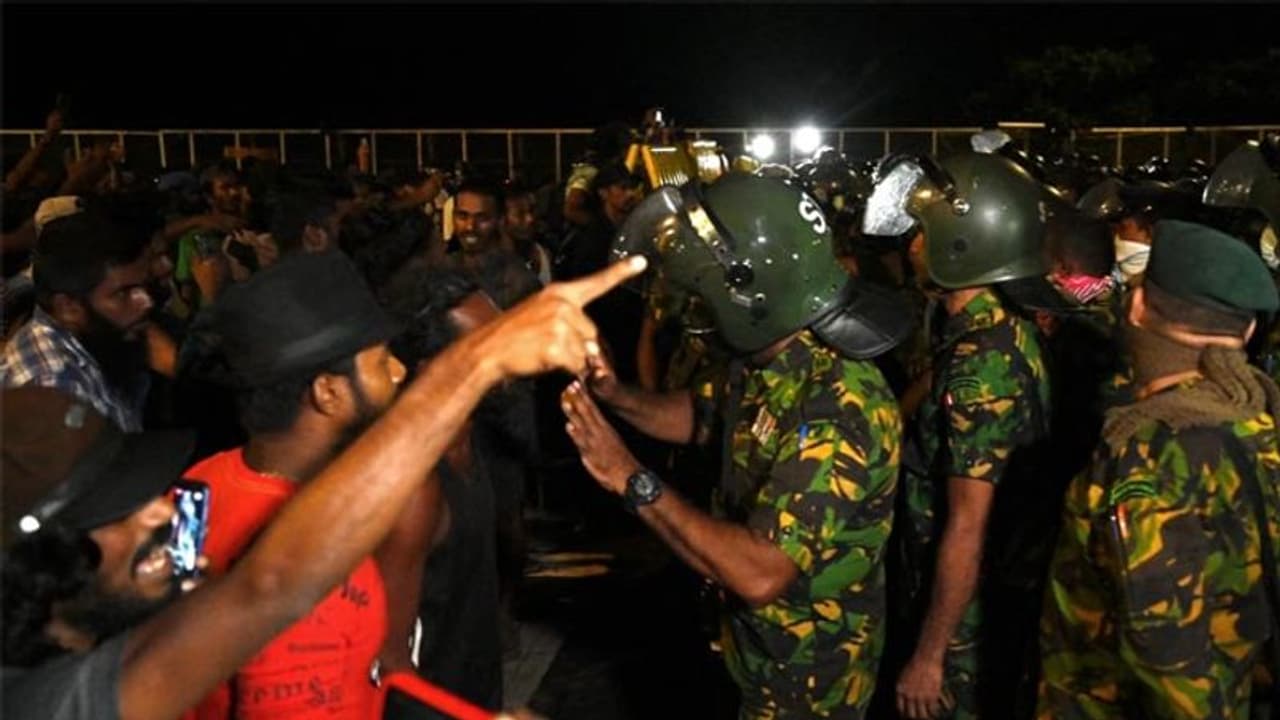The decision to evict the anti-government protesters came a day after Ranil Wickremesinghe was sworn in as President following the departure of ex-President Rajapaksa last week.
Sri Lankan security forces raided the main anti-government protest camp at the President's Secretariat here early Friday, arresting nine people and injuring several others, as protesters remained in the sensitive area despite the resignation of Gotabaya Rajapaksa.

The decision to evict the anti-government protesters came a day after Ranil Wickremesinghe was sworn in as President following the departure of ex-President Rajapaksa last week.
Separately, Dinesh Gunawardena, a senior politician considered a long-time Rajapaksa loyalist, took the oath as new prime minister on Friday, as President Wickremesinghe attempted to form a government to address the island nation's worst economic crisis.
The police, assisted by three armed forces and the Special Task Force, arrested the suspects aged 26 to 58 while evacuating protesters from the Presidential Secretariat office, its main entrance, and the offices in the Colombo Fort, according to The Daily Mirror Lanka.
According to the police, Crime Scene Investigation Officers (SOCO) and fingerprint analysts will be summoned to the President's Secretariat to gather scientific evidence. The arrested individuals will appear in court on Friday.
As protesters who have blocked entry to the President's Office since April 9 said they would continue their struggle until Wickremesinghe resigned, police said they were investigating under the supervision of the Colombo (Central) Senior Superintendent of Police (SSP).
On Friday, when fewer than 100 of them, police and special task force personnel forced them out.
After capturing the President and Prime Minister's residences and the Prime Minister's office on July 9, the protesters vacated them, but they remained in some rooms of the President's Secretariat at the Galle Face.
The protesters returned to Colombo on Wednesday after Parliament elected Wickremesinghe as the country's new President.
They refused to accept Wickremesinghe (73) as the country's new President, blaming him for the country's unprecedented economic and political crisis.
Protesters who had been camped out at the Secretariat's gate since April 9, when they began their anti-government protest that resulted in Rajapaksa's resignation as President last week, announced on Thursday that they planned to end their protest by 2 p.m. on Friday.
A group spokesman said, "There was discussion that we should respect the Constitution and end this protest."
However, the main protest group, blocking entry to the President's Office since April 9, has stated that it will continue to fight until Wickremesinghe resigns.
Another spokesman for the group said, "Our victory will come only when we can form the People's Assembly."
Meanwhile, international concern grew, with Ambassadors and High Commissioners stationed in Colombo expressing concern about the raid on Friday morning.
Julie Chung, the US Ambassador to Sri Lanka, expressed grave concern about "actions taken against protestors at Galle Face in the middle of the night."
The Ambassador tweeted, "we urge authorities to exercise restraint and provide immediate medical attention to those injured."
Sarah Hulton, the British High Commissioner to Sri Lanka, also expressed concern about reports from the Galle Face protest site.
She clarified her position on the importance of peaceful protest in a tweet.
The European Union's official Twitter handle in Sri Lanka stated that "freedom of expression" was critical to the current transition to power in the crisis-hit island nation and that it was difficult to see how severely restricting [freedom of expression] could help in finding solutions to the current political and economic crises.
Wickremesinghe, sworn in as Sri Lanka's eighth President on Thursday, said last night that the occupation of government buildings was illegal and that legal action would be taken against those who occupied them.
The new President stated that he will support peaceful protesters but will be tough on those who promote violence under the guise of peaceful protests.
During last week's protests, protesters set fire to Wickremesinghe's residence and occupied his office.
Wickremesinghe has scheduled his Cabinet's inauguration for Friday at the Prime Minister's office. Such ceremonies are usually held in the Secretariat, under protesters' control since July 9, when Rajapaksa fled to Male before resigning from Singapore last week.
Rajapaksa was forced to flee the country after a popular uprising erupted in response to his mismanagement of the economy. Rajapaksa resigned in exile in Singapore after remaining in power despite massive protests since April.
Sri Lanka, a country of 22 million people, is experiencing unprecedented economic turmoil, the worst in seven decades, with millions unable to purchase food, medicine, fuel, and other necessities.
Schools have been closed, and fuel has been restricted to essential services only. Patients cannot travel to hospitals due to a lack of fuel, and food prices are skyrocketing.
Hundreds of people are forced to stand in line for hours to buy fuel in several major cities, including Colombo, sometimes clashing with police and the military.
With an acute foreign currency crisis resulting in foreign debt default, the country announced in April that it would suspend nearly USD 7 billion in foreign debt repayment due this year, out of approximately USD 25 billion through 2026. The total foreign debt of Sri Lanka is USD 51 billion.
(With inputs from PTI)
Also read: Sri Lanka Decoded: Ranil Wickremsinghe talks tough, but can he walk the talk?
Also read: Ranil Wickremesinghe elected as Sri Lanka's new President, succeeds Gotabaya Rajapaksa
